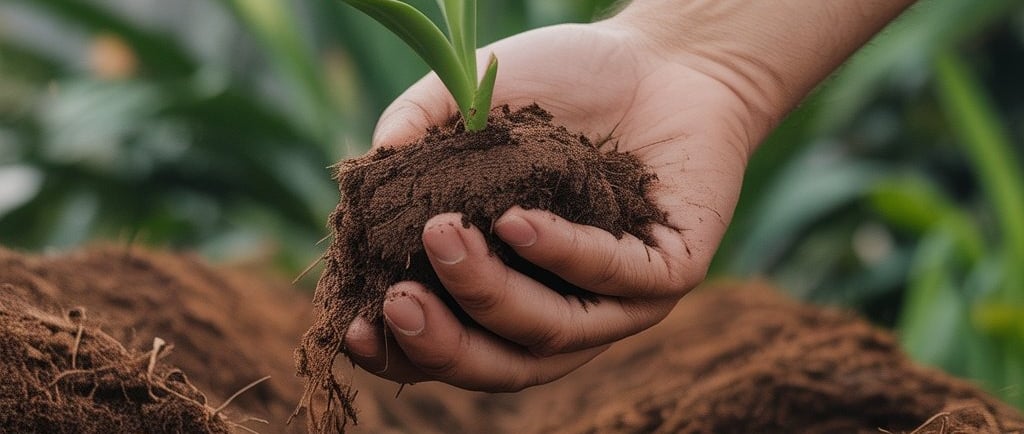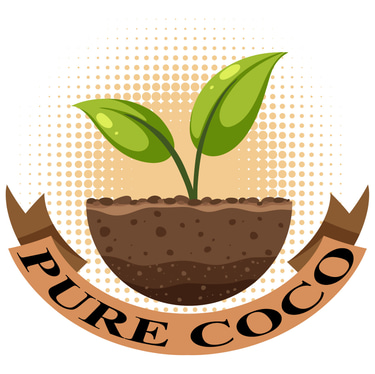Is Pure Coco Peat Good for Home Plants? Here's What Experts Say
7/16/20255 min read


Understanding Coco Peat: What It Is and How It Works
Coco peat, also known as coir pith or coconut coir, is an organic growing medium obtained from the fibrous husks of coconuts. This environmentally friendly substrate is produced through a meticulous process that separates the fibers from the coconut husk, resulting in a fine, spongy material that benefits both gardeners and plants. Its popularity has surged in recent years, shedding light on its numerous advantages over conventional soil.
One of the most notable properties of coco peat is its incredible ability to retain moisture. This feature stems from its unique fibrous structure, which can hold up to eight times its weight in water. This moisture retention not only helps in maintaining optimal hydration for home plants, but also reduces the frequency of watering, making it a cost-effective solution for gardeners. Additionally, the air-filled spaces within coco peat encourage aeration, allowing roots to breathe and promoting healthy growth. Proper aeration is crucial for preventing root rot and ensuring that plants receive the necessary oxygen for optimal performance.
Another vital characteristic of coco peat is its biodegradability. As a sustainable product derived from coconuts, coco peat decomposes naturally over time, enriching the soil with organic matter. This contrasts with many synthetic growing mediums that can contribute to environmental degradation. Furthermore, the pH level of coco peat is generally neutral, making it suitable for a wide range of plants, from flowers to vegetables.
In summary, the combination of moisture retention, aeration properties, and biodegradability positions coco peat as an exceptional choice for home plants. Its effectiveness as a growing medium compared to traditional soil makes it a preferred option for many gardeners seeking sustainable solutions. Incorporating coco peat into your gardening practices can lead to healthier plants and a more eco-conscious approach to gardening.
Benefits of Using Pure Coco Peat for Home Plants
Using pure coco peat as a growing medium offers numerous benefits for nurturing home plants. One of the primary advantages is its ability to enhance soil structure. Coco peat, derived from the husks of coconuts, has a unique fibrous texture that contributes to improved aeration. This property allows for better oxygen flow to plant roots, which is essential for healthy growth. Unlike traditional soil, coco peat creates a loose environment that maintains optimal drainage, thus preventing waterlogging. This feature is particularly beneficial for houseplants that require well-drained conditions.
In addition to its excellent drainage capabilities, pure coco peat plays a significant role in moisture retention. It can hold several times its weight in water while still allowing excess moisture to escape. This balance ensures that plant roots receive the necessary hydration without becoming overly saturated. Research highlights that plants grown in coco peat demonstrate less stress during dry periods, proving that this medium is adept at sustaining moisture levels efficiently.
The pH neutrality of coco peat further distinguishes it as an ideal substrate for growing a variety of indoor plants. With a pH level between 5.5 and 6.8, it supports the nutrient uptake for most plant varieties, promoting robust growth. Furthermore, coco peat fosters healthy root development by enabling roots to penetrate easily and access nutrients effectively. Experts suggest that utilizing this medium encourages more extensive root systems, leading to more vigorous plant growth overall.
Moreover, coco peat is resistant to pests and diseases commonly found in soil-based growing conditions, making it an excellent choice for those looking to minimize chemical interventions for plant care. Its natural properties reduce the risk of fungal growth and pest infestations, which can be detrimental to plant health. In real-world applications, garden enthusiasts and professional growers alike have reported notable improvements in plant vitality and resilience when employing coco peat as their preferred medium.
Challenges and Considerations When Using Coco Peat
Although pure coco peat is popular among gardeners for its lightweight and moisture-retentive properties, it is not without its challenges and drawbacks. One significant concern is nutrient deficiencies that can arise when using coco peat as a growing medium. Unlike soil, coco peat inherently possesses limited nutrients, which can lead to deficiencies in essential elements if not properly addressed. This conundrum necessitates regular fertilization with a balanced nutrient solution to ensure optimal plant growth. It is crucial for gardeners to select appropriate fertilizers that cater to the specific needs of their plants, considering the high water retention ability of coco peat may leach nutrients more rapidly.
Another challenge is the potential for salt build-up in coco peat over time. The harvesting and processing of coco peat can result in the presence of salts, which may adversely affect plant health. Excessive salt concentration can lead to root burn and stunted growth. To combat this issue, it is advisable for gardeners to pre-soak coco peat in fresh water before use, allowing excessive salts to be flushed out. Regular monitoring of the electrical conductivity (EC) of the growing medium can also help identify when salt levels are becoming problematic.
Additionally, the environmental impact of harvesting coco peat deserves consideration. While it is a renewable resource, large-scale extraction can lead to ecological concerns, such as habitat loss and decreased biodiversity in the regions from which it is sourced. Gardeners may consider sourcing coco peat from sustainable suppliers, as well as exploring alternative growing mediums that may reduce pressure on coco peat production.
By understanding these challenges and implementing appropriate solutions, gardeners can effectively utilize pure coco peat for their home plants, ensuring both healthy growth and consideration for the broader environment.
Best Practices for Incorporating Coco Peat into Your Indoor Gardening Routine
When incorporating coco peat into your indoor gardening routine, it is essential to follow a few best practices to ensure optimal growth for your plants. Coco peat, derived from coconut husks, offers excellent drainage and aeration properties, making it a popular choice among gardeners. To start, consider mixing coco peat with other substrates to create a tailored growing medium. A common mixture includes a 50:50 ratio of coco peat and potting soil, which helps provide additional nutrients while maintaining the beneficial characteristics of coco peat.
Watering is a crucial aspect of plant care, especially when using coco peat. This substrate has substantial water-retaining capabilities, so adjusting your watering schedule is vital. It is recommended to check the moisture level of the coco peat regularly; the medium should feel dry to the touch before the next watering. Over-watering can lead to root rot, while under-watering can cause dehydration. Incorporating a drip irrigation system can also be helpful, as it ensures consistent moisture without saturating the growing medium.
Furthermore, it is important to select the right plants that thrive in coco peat. Many tropical plants, such as orchids and ferns, benefit from the airy humidity coco peat provides. Additionally, vegetables like tomatoes and peppers can flourish with the right care. Gardeners have reported success using coco peat with seed propagation, as it provides an ideal environment for seedlings to establish their roots.
Inspiring success stories from fellow gardeners highlight the effectiveness of coco peat. Users have noted that transitioning to coco peat has improved water retention and reduced the frequency of fertilization, ultimately leading to healthier plants. Adopting these best practices will help you enjoy the advantages of coco peat while enhancing your indoor gardening experience.
Pure Coco
Explore our range of coco peat products today.
Support
Contact
info@purecoco.com
+91-9015762289
© 2025. All rights reserved.
Support
